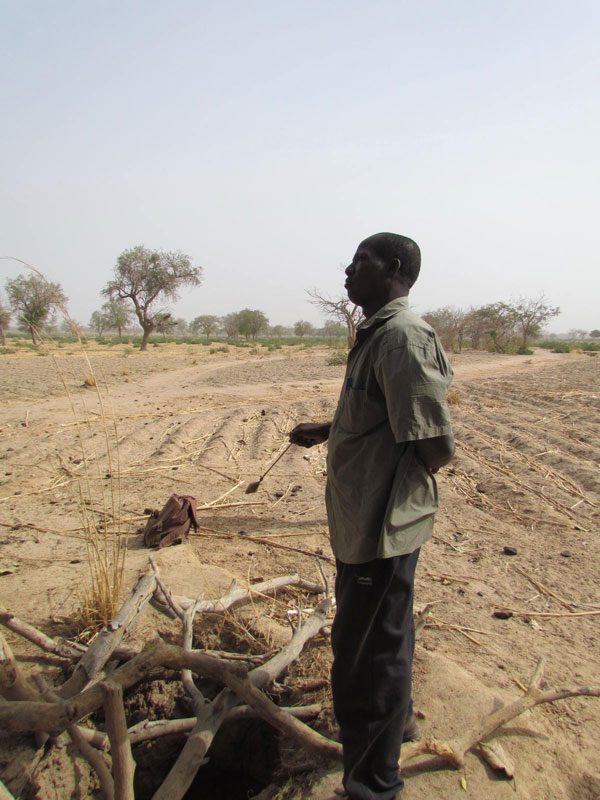Drilling Wells

BARKA Foundation works with the best well drillers in Burkina Faso. Our wells are guaranteed for 12 months, which ensures that the well is truly “positive” (water flows sufficiently for the village) and that there are no mechanical problems after installation.
Wells in the eastern region of Burkina, where the water table is so low, are often 150’-200’ deep. Thanks to water accounting BARKA is able to tell the well drilling company the general area of where water is most needed. The drilling company then conducts hydro-geologic testing in that area to locate the most likely places to find water.
Combining Ancient Traditions with Hi-Tech

When we say we like to combine indigenous and modern technologies, a good example can be seen in hydro-geologic testing. In this photo, Abel, the well drilling technician, uses cutting edge hi-tech equipment to determine where the water is underground, and how deep the water is located. One well driller BARKA works with prides itself on the IBM technology it uses to conduct its testing.
In this photo, Denis, a traditional water diviner (who comes from a family of water diviners) is dowsing to determine the same thing- where the water is, how deep, and even how much of it is underground. In this village, Denis came up with the same answer as the well drilling company for where to drill and the depth of the water!
As each modality can inform the other, utilizing both traditional and modern ways is important. Also, for an American NGO like BARKA to make use of indigenous technologies that have been used in Burkina Faso for thousands of years shows great respect to the local culture, which is recognized and appreciated by the local population. This is yet another way in which BARKA differentiates itself from other NGOs.
Working Together with the Village
After we receive the results of the hydro-geologic testing BARKA will call for another village meeting in which we share the information we received. Usually, the well driller will come up with the top 2 or 3 most feasible choices for drilling. The Water & Sanitation committee, working closely with the wider village population, must then determine their priority. This helps prevent conflicts over where the well is ultimately placed and gets the entire community on the same page about where their new well will be. This committee is also instrumental in serving as the liaison between BARKA and the village as a whole throughout the project cycle.


Drill, Baby, Drill
The day of the well drilling is genuinely exciting and always draws a crowd. Children will tell their children about the day they saw their village’s well get drilled.
Here’s a video of Peace, one of BARKA’s staffers, who like a journalist, documented the drilling of BARKA’s first well in the village of Tantiaka in 2012.
More Testing
Once the well is drilled and water is found, a series of tests take place:
Flow Rate: A well in Burkina Faso must have a flow rate of least 700 cubic meters/hour. Anything less is not considered a positive (viable) well. The wells that BARKA has drilled have all greatly exceeded this amount.
Rate of re-charge: When there is heavy demand on a well as there is in Burkina Faso, the rate of re-charge is critical. Oftentimes, a well will be pumped until no more water comes out. The recharge rate enables water users to know how long they have to wait to begin using the pump again to ensure that it doesn’t run dry. In some cases, wells are locked for certain periods of the day to ensure that the well has sufficient time to re-charge to be able to continue serving the community.
Water Quality Testing: Water testing and analysis is very important because water in Burkina Faso may have high levels of arsenic, heavy metals or pathogens that would be harmful if consumed.
If the results of the tests pass national standards, the well is considered “positive”, and a superstructure is built, the pump is installed, and the well is inaugurated.

Inauguaration
The inauguration is a very festive occasion. Not only is the entire village there, all the neighboring villages who will make use of the well also attend, as well as local and traditional authorities to give their blessing. Burkina’s national TV network has also come to BARKA’s inaugurations to make a report and share the news with the nation.
The first time BARKA utilized theatre as a vehicle to teach hygiene education was during the inauguration festivities in 2012 in the village of Tantiaka, and we have been doing so ever since. BARKA has hired the traditional dance group of Fada, “Troupe Yendabili” to perform at inaugurations, and the local musicians will play deep into the night with drums, calabash and a single stringed instrument played with a bow. Oftentimes, the village griot, a storyteller and village historian who shares the community’s history through song will come and sing this day into the history of the village. Villagers make food, the local millet beer known as “dolo”, and on such a day, no one goes hungry!
